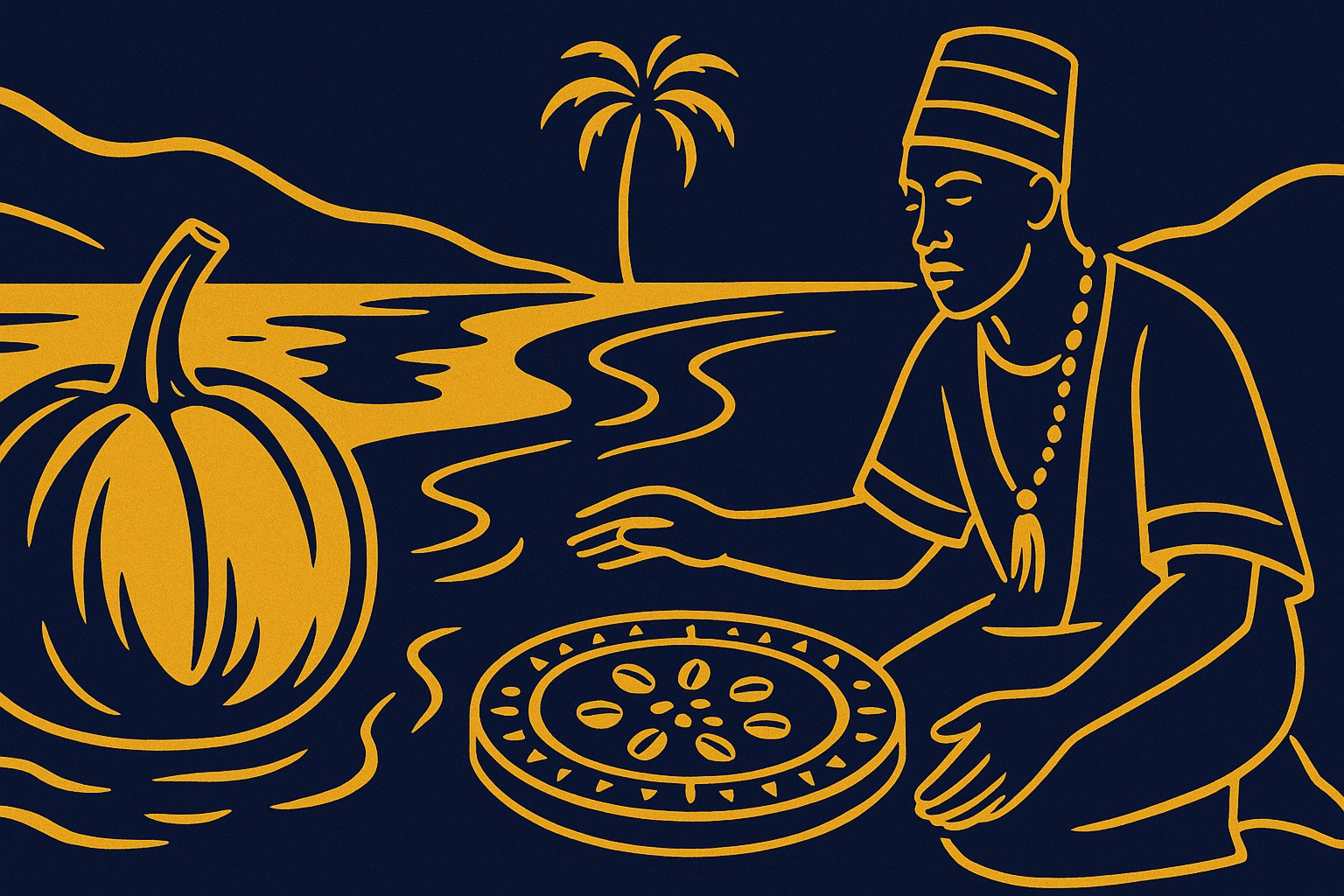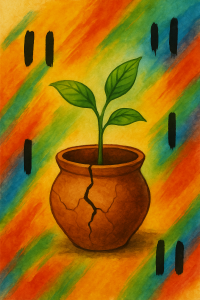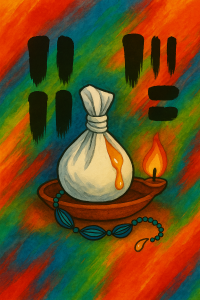What is Ose Otura? (Òsé Òtúrá in Ifá)
Ose Otura is a composite Odù born from Òsé (5) as the “left leg” and Òtúrá (13) as the “right leg.” In your practice, it’s important to remember: we are talking about Òsé as the base, not Otura-Ose (which is another, different composite). Direction matters.
In the Cuban line summarized in your annex, we’re told that in this Odù:
- Adámi Orisha is born (a primordial, mask-wearing priestly force linked to Odùdúwà and Inle).
- The art of killing and saving begins – life and death become two poles of one mystery.
- The needle (abéré) is born – that tiny tool that can wound or heal, tear or stitch.
- It is here that Odùdúwà gives spirit to the bodies molded by Obàtálá, animating humanity.
And above all, it is said:
“Oshe Tura is the messenger of all the signs… the ebó adá, the one who makes the sacrifices effective. Oshe Tura is the mouth that speaks, good and bad. He likes all colors and all herbs. The words or judgments of Oshe Tura always come to pass. It is an Odù of great spiritual and material wealth.”
So when Ose Otura appears in divination, it points to speech, mediation, third paths, and the power of words to either tear reality apart or stitch it back together.
The Core Myth: Oshun’s Child Who Saved the World
One of the key canonical currents in this Odù tells us:
- The sixteen major elders (the agba odù) decided to order the world but excluded Òşun, considering her “just a woman.”
- Without the feminine waters, nothing they tried worked. Projects collapsed. Conflicts multiplied. Humanity staggered under imbalance.
- From this tension, Òşé Tura was born in the womb of Òşun Olárì Ìyá ní Ayé – Òşun as head of the ancestral mothers – carrying within him:
- The feminine magic and sweetness of Òşun
- The masculine àṣẹ and authority of the sixteen elders
The text says plainly that as a male child, Òsé Tura “restored harmony between Oshun and the sixteen elders, saving the Earth from chaos.”
He doesn’t take sides; he becomes the third principle – that “igbà kẹ́tà” spoken of in Ogboni mysteries – the force that appears when two opposites stop fighting long enough to produce something new.
In practical language:
- When your masculine drive (control, structure, logic) tries to erase your feminine side (intuition, emotion, receptivity), your life stops flowing.
- Ose Otura emerges as the child of reconciliation – your ability to speak truth that heals instead of attacking, to design systems that honor feeling, to let both logic and intuition sit at the same table.
The war between life and death mentioned in this Odù – where “the art of killing and saving” is created – is not just about literal violence. It’s about that internal place where your own words either kill your chances or save your destiny.
A Proverb of the Earthworm: Quiet Power in Ose Otura
Before one of the verses of this composite Odù, we’re given a beautiful image:
“Majestic walk is the trekking of Eko, the earthworm.
The earthworm will never pass a road without leaving a mark.”
This is a perfect proverb for Ose Otura:
- The earthworm is soft, almost invisible, often ignored.
- Yet it aerates the soil, leaves channels, prepares the ground. Wherever it moves, the earth is changed.
Ose Otura tells you:
You don’t have to shout to have impact.
But you do have to be consistent.
Every conversation, every email, every prayer is like that earthworm trail. You are leaving marks in the soil of your destiny – especially through your mouth.
This is why the annex emphasizes that in this Odù we talk about mouth ulcers, lip sores, pharyngeal and laryngeal diseases – the body speaking where the heart has been careless.
When Ose Otura rules, the mouth is not just for eating; it is altar, weapon, and bridge.
Symbolism of Ose Otura: The Mouth, the Needle, and the Third Way
Let’s unpack some of the core symbolic elements of this Odu and how they show up in real life.
1. The Mouth of Àṣẹ
The text is explicit: Ose Tura is the mouth that speaks, good and bad. The sentences of Ose Tura always come true.
In daily life, this means:
- Your word has ridiculous power – for promise, curse, contract, oath.
- Casual insults, sarcasm, and “I was just kidding” can still become seeds with consequences.
- Blessings spoken with sincerity stick.
No wonder this Odù warns about pride and conflict:
“The world is at war with you because of your pride; they may accuse you of theft; do not walk with thieves.”
If your tongue isn’t aligned with your character, sooner or later, Ose Otura exposes the gap.
2. The Needle: Killing and Saving
In this Odù “the needle is born,” and also “the art of killing and saving.”
The needle:
- Can pierce and harm, like sharp words.
- Can stitch and close wounds, like a well-timed apology or clear boundary.
- Moves through both sides of the fabric – like someone who walks between visible and invisible worlds.
People under Ose Otura often:
- Work as healers, lawyers, mediators, administrators – professions that can either protect or oppress, help or harm, depending on intention.
- Have gifts in medicine, law enforcement, public relations, spiritual leadership – all jobs where speech and decisions carry heavy consequences.
3. The Third Principle (Ìgbà Kẹ́tà)
The annex stresses how Oshe Tura repeats the pattern of early myths about Èşù: the third principle that arises from two opposing forces.
In your life, that “third principle” might look like:
- The new kind of relationship you create after healing old patterns – not repeating past toxic patterns, not swinging to cold avoidance, but something different.
- The business model that is neither exploitative capitalism nor self-sabotaging martyrdom.
- The spiritual path that holds discipline and freedom, tradition and creativity together.
Ose Otura doesn’t tell you to choose one side.
It tells you to become the bridge.
Key Orisas of Ose Otura – and What They Do for You
When this Odù governs someone’s destiny, the annex lists a powerful council of affiliated Òrìṣà and forces:
- Orí – your inner head, your personal destiny and decision center, for direction, elevation, self-actualization.
- Ifá / Ọ̀rúnmìlà – for protection, success, guidance, and long life.
- Èṣù Odarà – for victory, progress, and helping your sacrifices reach the right place.
- Ẹgbẹ́ – your astral/spiritual companions, for support, leadership, and true comradeship.
- Ògún – for victory in battle, financial success, and clear forward motion.
- Òṣun – for fertility, child-rearing, protection of fundamental rights and dignity.
- Òṣù (Osu staff / cult) – for strong health and spiritual support, especially in chronic illness.
- Òké – mountain power, for victory over enemies and establishing fortune.
- Ṣàngó – for just leadership, courage, and satisfaction in achievements.
- Obàtálá – for clean leadership, elevation, and calm authority.
- Egúngún – the ancestral collective, for protection, victory, and guidance through tough decisions.
Notice the pattern:
Ose Otura surrounds you with counsel – elders, courts, councils, allies. This is not a “lone wolf” Odu. It thrives when you consult, listen, and respect both human and spiritual advisors.
Taboos of Ose Otura – and Their Inner Meaning
The taboos (eewo) for children of Ose Otura are very clear:
- No chicken. Symbolically, avoid scattered, fearful energy and petty fights over small things.
- No okra. A warning against sticky emotional entanglements and messy, confusing boundaries in love or business.
- No black, red, or tie-dye clothing. At a deeper level, this cautions against immersing yourself in chaos, drama, or performative rebellion that blocks your fortune.
- Do not swear at people. The tongue of Ose Otura is too powerful; curses come back with interest.
- Do not argue habitually. Constant debate drains your àṣẹ and blocks your blessings.
- Do not travel constantly away from your home base. You need a spiritual “root” to anchor your success.
- Do not mistreat dogs or domestic animals. Loyalty and service are sacred keys in this Odù; abuse them and you cut your own path.
- Do not underestimate women. Ose Otura is literally born to restore the dignity of Òşun and all the feminine forces. Disrespecting them brings disappointment and loss.
- Do not be in a hurry to succeed. Impatience creates emotional pain and disappointment; long game, earthworm style, is your path.
These aren’t superstition checklists; they are training tools. Each taboo protects you from misusing your mouth, power, or pace.
Ose Otura in Life Areas
1. Health
Ose Otura speaks about:
- Mouth and throat problems – ulcers, sores, laryngeal and pharyngeal issues.
- Chronic or recurring illnesses that disappear when spiritual obligations are honored, especially with Osu staff and the appropriate ebo in traditional context.
On a home-friendly level, this Odù urges you to:
- Watch what you swallow – food, substances, but also words and opinions.
- Treat recurrent throat or mouth issues as reminders: what have I not said truthfully, or what have I said that I regret?
- Maintain a simple health discipline: enough water, less sugar, regular rest, and periodic spiritual cleansing.
2. Love & Family
Because this Odù is born from reconciling Oshun and the elders, it highlights:
- The central role of women, mothers, and feminine energy in your stability. Disrespecting your mother or partner brings losses.
- A tendency for triangular dynamics – third people, third paths, mediators – in relationships.
- The need to speak clearly instead of using silence as punishment or gossip as relief.
If your personal Odù is Ose Otura, you often:
- Attract partners who force you to choose between pride and vulnerability.
- Become the “therapist” or mediator in your family without being asked.
The medicine here:
Speak truth early, with kindness. Don’t wait until resentment turns your throat into a battlefield.
3. Wealth & Work
Remember: Ose Otura is “an Odù of great spiritual and material wealth.”
The annex lists some of the most aligned professions:
- Ifá / Orisa priesthood
- Medical and paramedical roles
- Herbal counselors
- Lawyers, judges, advocates
- Police, immigration, customs officers
- Civil / religious administrators
- Business owners, marketers, PR professionals
Common challenges:
- Being accused of things you didn’t do, especially theft or misuse of resources.
- Getting into trouble for others’ actions because you stood too close to shady people.
- Pride blocking collaborative opportunities.
Ose Otura’s wealth comes when your integrity, speech, and alliances are clean. You don’t have to be perfect; you do have to be transparent and consistent.
4. Faith, Ancestors & Spiritual Practice
This Odù is deeply tied to:
- Egúngún – the ancestral collective, who here are asked to be fed, remembered, and honored.
- Osu staff and cult – symbol of disciplined, upright spiritual authority in healing.
If you carry Ose Otura strongly, your life improves drastically when you:
- Keep a simple ancestor space (photos, a glass of water, a candle used respectfully).
- Speak to your Orí regularly – even a short morning prayer acknowledging your head and asking for coolness and clarity.
- Avoid spiritual shortcuts. No “fast fixes.” Earthworm mentality.
When Does Ose Otura Usually Appear?
In divination, this Odu often arises when:
- You’re between two forces – two families, two careers, two cities, two paradigms.
- There is conflict around your name or reputation – accusations, gossip, misunderstandings in community.
- Your health crises seem linked to stress, unspoken truths, or spiritual neglect, especially around Osu or ancestor obligations.
- You are being asked to carry a message, mediate a conflict, or make someone’s “ebo effective” – you’re the one who can translate.
If your birth Odù is Ose Otura, these themes become lifelong training, not just temporary tests.
A Simple Ose Otura–Inspired Home Ritual (No Sacrifice)
Traditional texts for this Odù speak about sacrifices with birds, roosters, and offerings to Osu staff.
For a modern, home-based practice that stays safe and respectful, you can work with the symbolism instead of the literal rites:
Ritual: “Cooling the Mouth, Aligning the Head”
When to do it:
On a Friday (day of Òşun) or on a day when you feel your words have gone too far, or your throat feels heavy.
You’ll need (all optional & easily available):
- A white candle (for Obàtálá and clarity)
- A glass of fresh water (for Osu / Oke and coolness)
- A small bowl with a bit of honey (for Òşun – if you’re allergic, skip it)
- A pinch of mint or chamomile (tea bags are fine)
- A small clean stone or pebble (representing your Orí’s stability)
Steps:
- Prepare the space.
Place the candle in the center. To one side, the water glass; to the other, the honey. Put the stone in front of the candle. - Invoke your Orí.
Sit comfortably. Touch your forehead gently and say, in your own language, something like:
“Orí mi, my inner head, align my thoughts, my words, and my path today. Let my mouth speak only what builds my destiny, not what destroys it.” - Offer the sweetness.
Light the candle. Dip a clean finger in the honey and touch it lightly to your tongue, saying quietly:
“May my words carry sweetness when sweetness is needed, truth when truth is needed, and silence when silence is sacred.” - Drink the coolness.
Prepare a warm infusion of mint or chamomile. When it cools slightly, take three slow sips, focusing on your throat. With each sip, release one regret, one resentment, one fear you’ve been storing in your voice. - Lay down the stone.
Hold the stone in your hand and imagine roots extending from your feet into the earth. Then place the stone back before the candle and say:
“Like the earthworm, let my steps leave a blessing where I walk. Let my mark be quiet but lasting.” - Close.
Let the candle burn for a while in a safe place, or snuff it out gently if needed. Pour the water outside at the base of a tree or in a plant, as a small gesture to Oke and the forces that keep you grounded.
Always adapt ritual work to your health, your space, and your local laws; nothing here replaces medical or psychological care.
A Spiritual Bath for the Mouth and Throat
To harmonize with Ose Otura’s healing side, you can prepare a simple bath focusing on the shoulders, neck, and head area.
Ingredients (choose what you can find):
- Chamomile (relaxation, healing)
- Fresh mint (clarity, cool speech)
- Basil (protection, cleansing)
- A little honey or brown sugar (sweetening communication)
How to use:
- Make a strong tea with the herbs, let it cool to lukewarm, add the honey or sugar.
- After your normal shower, pour the infusion slowly from your neck down over your chest and shoulders, praying in your own words for your voice to heal and align with your destiny.
- Air-dry if possible, or pat gently with a clean towel.
If you’ve had chronic throat issues, remember: this bath supports, but does not replace, proper medical care. Odu always walks with both spirit and science.
Final Reflection
Ose Otura is the Odù that sits between needle and thread, life and death, pride and reconciliation, silence and speech.
It reminds you that:
- Your words are not cheap.
- Your alliances matter.
- Your feminine and masculine halves must both sit at the table.
- Even the smallest creature – like the earthworm – leaves a mark on destiny.
Whenever you feel caught between two worlds, two choices, or two generations, remember the child of Òşun who restored harmony when the elders’ arrogance almost destroyed everything. That same principle lives in you.
Stay blessed, keep your tongue cool and your Orí awake.
Babá Tilo de Àjàgùnnà
DAILY IFÁ ACADEMY
What to Ask Next?
If you’re a supporting subscriber using the GPT companions “Voice of Orisha” and “Wisdom of Ifá”, here are some Ose Otura–aligned questions you can explore:
- Destiny & Purpose:
“How does Ose Otura describe the way my words and promises shape my Orí and destiny?” - Health & Energy:
“In the light of Ose Otura, what spiritual and practical steps can I take to heal my throat, voice, or chronic fatigue?” - Love & Family:
“What does Ose Otura teach me about balancing feminine and masculine energies in my relationships and family decisions?” - Wealth & Work:
“According to the teachings of Ose Otura, how can I clean my reputation, choose honest alliances, and open stable paths for prosperity?”
These questions help you carry the wisdom of Òsé Òtúrá from myth into your calendar, conversations, and concrete decisions.
Sources: Daily Ifa Newsletter.






